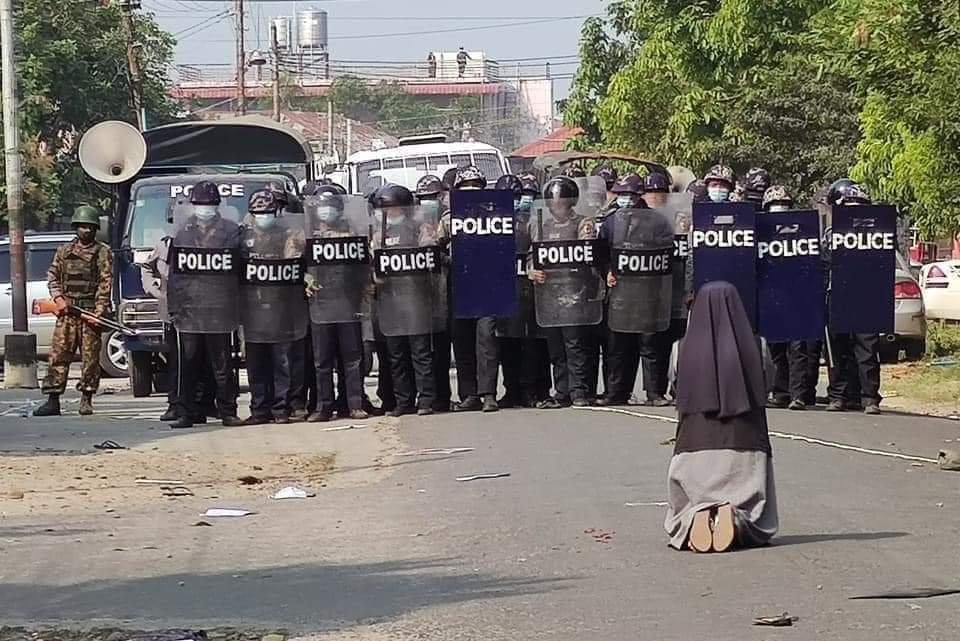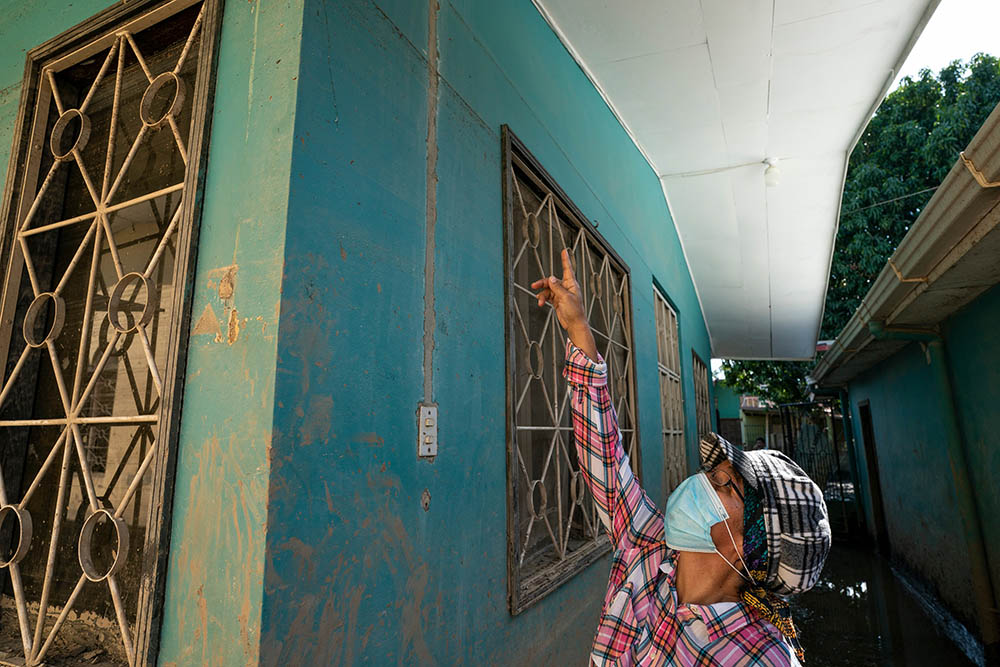
Sr. Ann Nu Thawng, a member of the Sisters of St. Francis Xavier, kneels in front of police and soldiers during an anti-coup protest Feb. 28 in Myitkyina, Myanmar. (CNS/Courtesy of the Myitkyina News Journal)
Editor's note: On March 11, 2020, the World Health Organization said COVID-19 could be characterized as a pandemic. One year later, millions of lives have been lost to the virus, and people worldwide are taking stock of the last year and what the future holds. This week, Global Sisters Report looks at the impact of the pandemic on religious life with a special series, Coronavirus: One Year Later.

(NCR, GSR logo/Toni-Ann Ortiz)
Recent images of Catholic sisters underscore one hallmark trait of women religious: courage.
One is of Sr. Ann Nu Thawng kneeling before armed forces in Myanmar, pleading with them not to shoot protesters. The military didn't open fire, and about 100 protesters took refuge in the convent of her Sisters of St. Francis Xavier community because of her bravery.
Another is of Sr. Luma Khudher walking amid the rubble in Qaraqosh, Iraq, as she and the other Dominican Sisters of St. Catherine of Siena struggle to rebuild six years after that area near Mosul was liberated from the Islamic State group. They were eagerly awaiting Pope Francis' March 5-8 visit to Iraq, hoping it would bring attention to the suffering in the region.
Yet another shows Srs. Milena Vanegas and Victoria Emérita of the Sisters of Charity of Santa Ana amid the mud and wreckage of their nursery school and convent in La Lima, Honduras, in the aftermath of two hurricanes that swept across much of Central America in November.
In any of these situations, the temptation would be to cower, to give in, to give up. But that just isn't in the nature of the Catholic women religious we write about in Global Sisters Report, who draw from a spiritual strength. They're human, of course, so they experience the same fear, anxiety, doubt and, at times, discouragement that all of us do. But with their vows and intertwined with their different charisms is this universality of courage, one of the gifts of the Holy Spirit.
Advertisement
I also was reminded of this while editing a special series of columns tied to the one-year anniversary of the World Health Organization declaring the coronavirus a pandemic on March 11, 2020. To try to get a sense of how the pandemic has affected religious life around the globe, we invited regional associations of women religious to contribute columns assessing the impact on ministry, spirituality and community life among congregations in their areas.
The first of these columns, by Sr. Hellen Anthony Bandiho, secretary general of the Association of Consecrated Women in Eastern and Central Africa, appears today. The rest — from Croatia, the United States, India, the Philippines, Canada, Poland, Korea and the International Union of Superiors General — will run over the next two weeks.
In these columns, some common themes emerged: the challenges to ministries; the difficulty of isolation and disruption of community life, which is central to so many congregations; the deepening of prayer life despite the inability in many cases to attend Mass or receive the Eucharist regularly; and the crucial role of technology in keeping connected. Differences also became clear, particularly in areas of the world where deprivation is a harsh reality even in normal times, let alone during a pandemic.
But I was struck by the examples of courage, a willingness to serve however sisters could to help others: volunteering in hospitals and nursing homes, caring for COVID-19 patients; ministering to migrants and people experiencing homelessness; and providing food and necessities from their own means and allowances.

Sr. Victoria Emérita points to the floodwater line on a building at Our Lady of the Holy Fountain Nursery School in La Lima, Honduras. (Gregg Brekke)
This was a difficult assignment, as we are still in the midst of the pandemic. Even as treatments evolve and vaccines are administered, we are months, maybe much longer, from a post-COVID-19 world. Still, the one-year mark is a logical time to assess the experience of the pandemic, the changes wrought on religious life and the lessons being learned.
Since the pandemic began, we have published dozens of stories by our network of journalists about the impact of the virus on women religious and their ministries. We've also carried dozens of columns by sisters about their experiences during the pandemic. You can find all our coverage here.
Ursuline Sr. Michele Morek, one of our two sister liaisons who edits our columns, identified some common topics: Sisters expressed their own views about having to modify ministries, meet new needs, and deal with the chaos and challenges that lockdowns pose. Doctors, nurses and health care workers wrote poignant descriptions of serving COVID-19 patients amid unprecedented challenges and demands. Other sisters have explored how the pandemic has changed their spirituality, the ways they pray, and their lives and that of their communities.
Yet through all these challenges, sisters are exhibiting that hallmark of courage. We don't know yet the full extent of how the pandemic will change religious life. But we encourage sisters to continue to share their insights and experiences with Global Sisters Report as this seismic situation ripples through countries, societies, congregations and communities. Through the voices of many, patterns will emerge.







